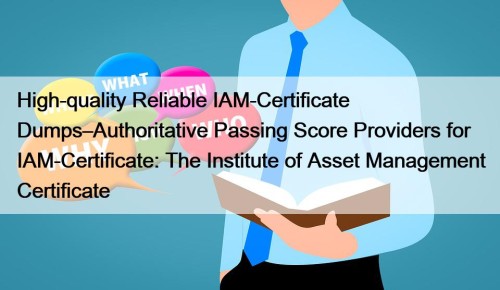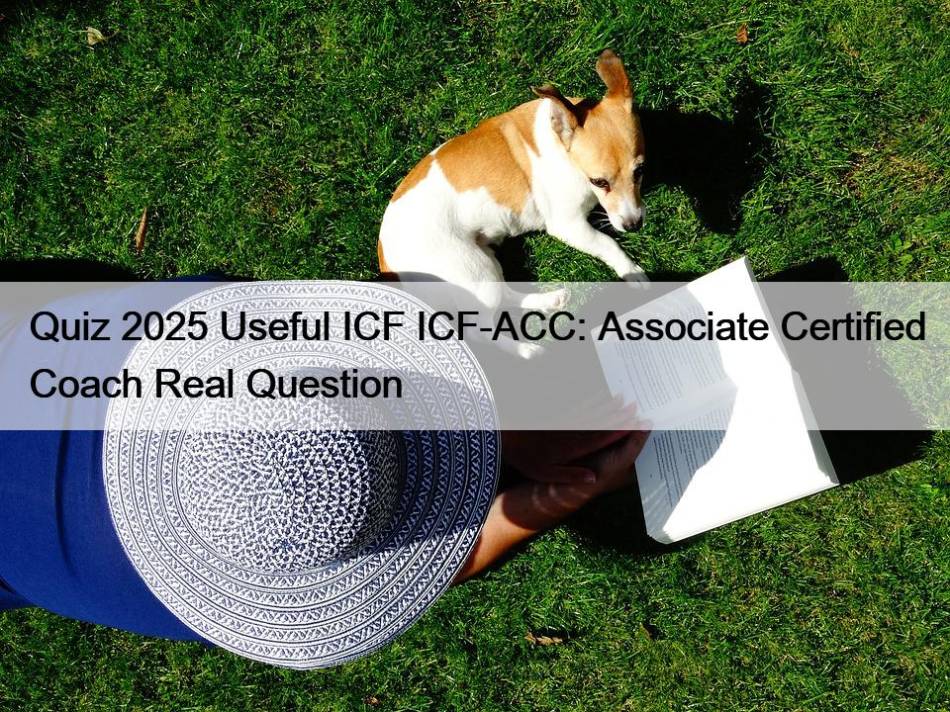Most Popular
 High-quality Reliable IAM-Certificate Dumps–Authoritative Passing Score Providers for IAM-Certificate: The Institute of Asset Management Certificate
High-quality Reliable IAM-Certificate Dumps–Authoritative Passing Score Providers for IAM-Certificate: The Institute of Asset Management Certificate
Real4dumps free update our training materials, which means you will ...
 Salesforce-Slack-Administrator Valid Study Notes - Key Salesforce-Slack-Administrator Concepts
Salesforce-Slack-Administrator Valid Study Notes - Key Salesforce-Slack-Administrator Concepts
With years of experience in the field, Actual4Cert are always ...
 {2025} Salesforce PDI Dumps - A Direction Toward Certain Success
{2025} Salesforce PDI Dumps - A Direction Toward Certain Success
What's more, part of that ActualtestPDF PDI dumps now are ...



Quiz 2025 Useful ICF ICF-ACC: Associate Certified Coach Real Question

For purchasing the ICF-ACC study guide, the cndidates may have the concern of the safety of the websites, we provide you a safety network environment for you. We have occupied in this business for years, and the website and the ICF-ACC Study Guide of our company is of good reputation. We also have professionals offer you the guide and advice. ICF-ACC study guide will provide you the knowledge point as well as answers, it will help you to pass it.
The ICF ICF-ACC are available in the desktop version, web-based, or pdf format. If you install ICF-ACC practice software on your Windows desktop, you won’t need the internet to access it later. However, you obviously can access the ICF ICF-ACC practice exam software by Pass4SureQuiz on the web. It works on all major browsers like Chrome, IE, Firefox, Opera, and Safari, and operating systems including Mac, Linux, IOS, Android, and Windows.There are no special plugins required for you to use the ICF-ACC Practice Exam. The ICF ICF-ACC questions pdf version is reliable and easy to use anywhere at any time according to your needs. The ICF-ACC questions and answers pdf can be printed easily and thus accessed anywhere.
Free PDF Quiz 2025 ICF-ACC: Associate Certified Coach – High Pass-Rate Real Question
The desktop-based practice exam is customizable, tracks your progress, and creates a real Associate Certified Coach (ICF-ACC) exam environment. This software works offline on Windows computers. The web-based practice exam is similar to the desktop-based practice exam and can be taken on any browser without needing to install separate software. Moreover, the web-based Associate Certified Coach (ICF-ACC) practice exam is also compatible with all operating systems.
ICF ICF-ACC Exam Syllabus Topics:
| Topic | Details |
|---|---|
| Topic 1 |
|
| Topic 2 |
|
| Topic 3 |
|
ICF Associate Certified Coach Sample Questions (Q33-Q38):
NEW QUESTION # 33
Which best reflects a plan of action that is likely to be successful?
- A. Try as hard as they can to become a top executive
- B. Complete a report two weeks ahead of schedule
- C. Take longer lunch breaks when they have the time
- D. Put more effort into their work so the boss is impressed
Answer: B
Explanation:
ICF Competency 8 ("Facilitates Client Growth") emphasizes creating actionable, specific, and measurable plans to support client success. A successful action plan aligns with the client's goals and is realistic and time-bound (ICF Definition of Coaching). Let's evaluate:
A . Try as hard as they can to become a top executive: This is vague, lacks specificity, and isn't time-bound, making success hard to measure or achieve (Competency 8).
B . Complete a report two weeks ahead of schedule: This is specific, measurable, achievable, and time-bound, reflecting an effective action plan per ICF standards for facilitating growth.
C . Take longer lunch breaks when they have the time: This lacks purpose or alignment with professional goals and isn't a clear plan for success (ICF Code of Ethics, Section 1).
D . Put more effort into their work so the boss is impressed: This is vague and subjective, missing the clarity and structure ICF action plans require.
Option B best reflects a successful plan, per ICF's focus on actionable outcomes.
NEW QUESTION # 34
In which situation should a coach recommend that a client speak with a therapist?
- A. The coach notices the client often seems distracted during sessions
- B. The coach feels like their guidance has not been helping the client's professional development
- C. The client explains that they have been feeling nervous about an upcoming change at work
- D. The client says their frequent and intense mood swings are disrupting their life
Answer: D
Explanation:
The ICF Code of Ethics (Section 2.5) mandates referral when client needs fall outside coaching's scope, such as mental health conditions (ICF Coaching Boundaries). Mood swings disrupting life suggest a clinical issue. Let's review:
A . The coach feels like their guidance has not been helping the client's professional development: This may require coaching adjustments, not therapy (Competency 8).
B . The coach notices the client often seems distracted during sessions: Distraction alone doesn't indicate therapy unless tied to mental health (Competency 6).
C . The client says their frequent and intense mood swings are disrupting their life: This suggests a potential disorder (e.g., bipolar), requiring therapeutic intervention (Section 2.5).
D . The client explains that they have been feeling nervous about an upcoming change at work: Situational nervousness is coachable (Competency 7), not requiring therapy.
Option C justifies a therapy recommendation, per ICF ethics and boundaries.
NEW QUESTION # 35
Which is true of the norms, values, and beliefs associated with ethical conduct in coaching?
- A. They are frequently hard to learn.
- B. They are a higher standard than laws.
- C. They are often unspoken.
- D. They are consistent across organizations.
Answer: C
Explanation:
The ICF Code of Ethics outlines explicit standards, but the underlying norms, values, and beliefs (e.g., integrity, respect, client autonomy) are often implicit, shaping ethical conduct beyond written rules. These are embedded in the ICF Definition of Coaching and competencies. Let's evaluate:
A . They are often unspoken: Values like trust and empowerment are foundational to ICF's approach (Competency 5: "Cultivates Trust and Safety") but aren't always explicitly stated in every interaction, making this true.
B . They are consistent across organizations: While ICF provides a standard, norms and values vary across coaching bodies or cultures, so this is false.
C . They are a higher standard than laws: Ethics may exceed legal requirements (e.g., confidentiality beyond legal mandates), but this isn't universally true and isn't the best fit.
D . They are frequently hard to learn: ICF makes ethics accessible through training and the Code, so this is inaccurate.
Option A is true, reflecting the implicit nature of ethical norms in ICF coaching.
NEW QUESTION # 36
A coach facilitates a client's growth by shifting the client's focus to the
- A. behavior rather than the client's sense of self
- B. problem rather than the opportunity to Build potential
- C. current situation rather then the future outcome
- D. individual self rather than the coaching topic or goal
Answer: A
Explanation:
ICF Competency 8 ("Facilitates Client Growth") involves "partnering with the client to transform learning and insight into action," often by focusing on observable behaviors that support goal achievement. Shifting focus to behavior aligns with coaching's action-oriented nature while respecting the client's autonomy (ICF Code of Ethics, Section 1). Let's evaluate:
A . Current situation rather than the future outcome: Coaching balances present awareness with future goals (Competency 7), not prioritizing one over the other.
B . Individual self rather than the coaching topic or goal: Focusing solely on "self" risks veering into therapy, while coaching targets specific goals (ICF Definition of Coaching).
C . Behavior rather than the client's sense of self: This fosters growth by addressing actionable steps rather than identity, aligning with Competency 8 and coaching's practical focus.
D . Problem rather than the opportunity to build potential: Coaching emphasizes potential and solutions (ICF Definition of Coaching), not dwelling on problems.
Option C best reflects how a coach facilitates growth, per ICF's competency and ethical framework.
NEW QUESTION # 37
During the coaching session, a client has a new and very clear insight about the way that they have been treating a colleague. The best response is:
- A. Tell them that the way they have been treating the colleague is unacceptable, and they need to change if they want to be a better person.
- B. Ask them how they would feel if they were the colleague being treated in this way.
- C. Ask the client how this new insight could impact his/her behavior towards the colleague.
- D. Suggest that this insight could be very useful in changing the client's behavior toward the colleague.
Answer: C
Explanation:
Comprehensive and Detailed Explanation:
Option C aligns with ICF Core Competency 8, "Facilitates Client Growth" (8.1 - Works with the client to integrate new awareness into behaviors), by encouraging the client to explore the practical implications of their insight. This fosters autonomy (Competency 8.3) and partnership (Competency 2.2), while respecting the client's experience per Ethics Section 1.1.
Option A judges the client, violating Competency 4.1 (non-judgmental stance) and Ethics Section 2.2 (avoiding bias). Option B shifts focus to empathy, which may be useful but doesn't directly integrate the insight (Competency 8.1). Option D suggests rather than partners, missing full collaboration. C best supports client-led growth.
NEW QUESTION # 38
......
The ICF ICF-ACC certification topics or syllabus are updated with the passage of time. To pass the ICF Associate Certified Coach exam you have to know these topics. The Pass4SureQuiz ICF-ACC certification exam trainers always work on these topics and add their appropriate ICF ICF-ACC Exam Questions And Answers in the ICF-ACC exam dumps. These latest ICF Associate Certified Coach exam topics are added in all ICF Associate Certified Coach exam questions formats.
ICF-ACC Test Guide Online: https://www.pass4surequiz.com/ICF-ACC-exam-quiz.html
- ICF-ACC Real Question - Free PDF Quiz 2025 ICF First-grade ICF-ACC Test Guide Online 〰 Easily obtain free download of ➤ ICF-ACC ⮘ by searching on ➠ www.examsreviews.com 🠰 🔧ICF-ACC New Soft Simulations
- ICF-ACC Exam Simulations 🌝 ICF-ACC Exam Simulations 💁 Actual ICF-ACC Tests 🥟 Easily obtain free download of ▛ ICF-ACC ▟ by searching on ☀ www.pdfvce.com ️☀️ ☘Valid Exam ICF-ACC Vce Free
- ICF-ACC Real Question - Free PDF Quiz 2025 ICF First-grade ICF-ACC Test Guide Online 🌕 Search for ⇛ ICF-ACC ⇚ and download it for free immediately on ➠ www.torrentvalid.com 🠰 🐡Actual ICF-ACC Tests
- ICF-ACC Exam Study Guide 🥽 ICF-ACC Exam Vce Format 🚔 ICF-ACC Exam Tips 👪 Easily obtain free download of { ICF-ACC } by searching on 「 www.pdfvce.com 」 🕜ICF-ACC Testking
- ICF-ACC Real Question - 100% Pass Quiz ICF - ICF-ACC - First-grade Associate Certified Coach Test Guide Online 🧍 Search for ▷ ICF-ACC ◁ and download it for free immediately on 「 www.real4dumps.com 」 ⚫Valid ICF-ACC Exam Simulator
- 2025 ICF-ACC Real Question 100% Pass | Trustable Associate Certified Coach Test Guide Online Pass for sure 🔻 Open website { www.pdfvce.com } and search for ➥ ICF-ACC 🡄 for free download 📄ICF-ACC Latest Mock Test
- Valid ICF-ACC Exam Simulator 🤮 Actual ICF-ACC Tests 🦖 Exam Dumps ICF-ACC Collection 🍐 Search for 「 ICF-ACC 」 and easily obtain a free download on ➤ www.torrentvalid.com ⮘ 🚝ICF-ACC Exam Study Guide
- ICF-ACC Test Certification Cost 🏐 Latest ICF-ACC Dumps Free 🟢 ICF-ACC Latest Mock Test 💔 Open ⏩ www.pdfvce.com ⏪ and search for ➤ ICF-ACC ⮘ to download exam materials for free 🤢Latest ICF-ACC Test Fee
- ICF-ACC Testking 🦜 Valid Test ICF-ACC Tutorial 🎬 ICF-ACC Exam Simulations 🥟 Copy URL ✔ www.exams4collection.com ️✔️ open and search for ⮆ ICF-ACC ⮄ to download for free 😆Valid Test ICF-ACC Tutorial
- 100% Pass ICF ICF-ACC Marvelous Real Question 🦉 Enter ✔ www.pdfvce.com ️✔️ and search for ▶ ICF-ACC ◀ to download for free 🍓ICF-ACC New Soft Simulations
- ICF-ACC Test Certification Cost ⏩ Valid Test ICF-ACC Tutorial 🧪 ICF-ACC Reliable Study Questions 🎴 Easily obtain 【 ICF-ACC 】 for free download through 「 www.passtestking.com 」 🦔ICF-ACC Latest Mock Test
- ICF-ACC Exam Questions
- course.alsojag.com ebcommzsmartcourses.com oacademy.de-mo.cloud dialasaleh.com selfboostcourses.com pbsdigitalacademy.online www.drnehaarora.com free.ulearners.org hopesightings.ehtwebaid.com math1004.org
Tags: ICF-ACC Real Question, ICF-ACC Test Guide Online, Latest ICF-ACC Exam Cram, Guaranteed ICF-ACC Success, ICF-ACC New Study Materials